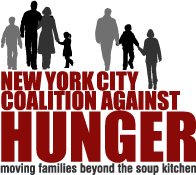Monday, October 30, 2006
Trans-fat ban should be coupled with funding increases for Emergency Food Providers
Monday, October 23, 2006
Hardworking Responsibility
Monday, October 16, 2006
Going for its goal
Friday, October 13, 2006
New Federal Law Could Hurt City
Joel Berg, Executive Director of the New York City Coalition Against Hunger, also attended, and stated that only 23 percent of welfare recipients in New York City have left welfare because they found work, and one-quarter of those were no longer employed six months later.
In his testimony regarding welfare reform, Berg said you cannot judge the success of welfare reform solely by how many people leave welfare for work. He likened this to judging the success of a hospital solely by how many people leave. Berg stated, "you never hear a public official say: 'Well, fewer people are getting social security, great!'"
Thursday, October 05, 2006
Food Stamp Program participation down
The New York City Human Resources Administration (HRA) just released data indicating participation in the Food Stamp Program in
Wednesday, October 04, 2006
Economic Opportunity Report
A response by Joel Berg, executive director of the New York City Coalition Against Hunger, was quick to follow after Mayor Michael Bloomberg and his commission against poverty released the Economic Opportunity Report in September. The economic report released by Bloomberg outlines goals that the Bloomberg administration is tackling to combat poverty. It also focuses on three specific poverty groups; children, young adults 16-24, and the working poor. Berg agrees that this is a good place to start, since these groups comprise a large percentage of New Yorkers living in poverty, although other populations living in poverty should not be forgotten.
Monday, October 02, 2006
Mayor Bloomberg proposes Trans Fat Ban
The Bloomberg Administration has proposed a ban on most trans fats in
